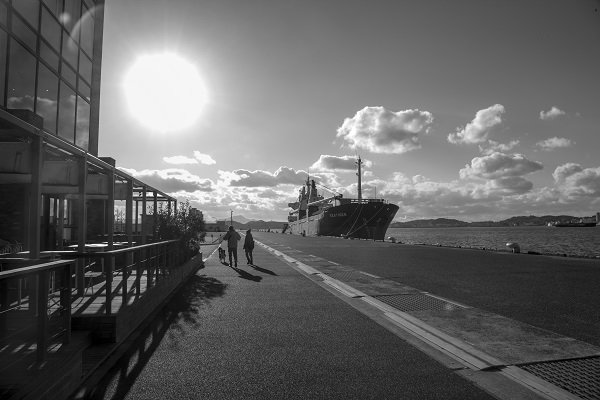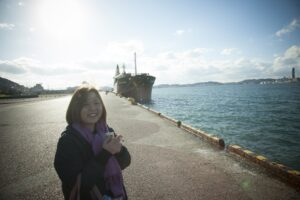
After meeting Donald Vaseau, a former U.S. Marine and former Allied POW, I began to think, “I want to build a memorial for Allied POWs at Moji Port.”
After meeting Mr. Donald Versaw, a former U.S. Marine and former Allied POW, I began to think, “I want to build a memorial for Allied POWs at Moji Port.”
Many of the POWs who arrived at the port of Moji never returned to their hometowns and died in a foreign land, Japan. People in this town don’t know about its history… I heard that even in the United States, the issue of Japanese prisoners of war during the Pacific War was not made public for a long time.
I wondered what it would be like to be forgotten even though they had risked their life for their country.
Even though I wanted to make a memorial, it wasn’t easy and I gave up. However, I took this opportunity to start researching things about Allied POWs and the relationship between Kitakyushu and the war. After a while, why the Netherlands? Britain? Did Australia fight Japan? I had a lot of questions, and when I didn’t understand something, I immediately looked it up on the internet. I knew nothing about southern Asia before or during the war.
There wasn’t much interest here in Kitakyushu regarding the history and memorial of Allied POWs. Even if that were the case, I thought it couldn’t be helped because it was a prisoner of war from an enemy country.
Meanwhile, I decided to look into some of the war-related memorials that already exist in Kitakyushu City. Cenotaph for the Yahata Air Raid, Memorial Cross, and World Peace Pagoda at Moji Port. The World Peace Pagoda, which was supported by the families of those who died on the Burma front, was closed at the end of 2011 (it was reopened in August 2012 with support from the Myanmar government). I realized that war has become irrelevant to my generation and even younger people. When I visited the pagoda, I could see the feelings of people who were thinking about those who died in the war in Burma. Looking at the names carved into the stones for donations, was like looking at an event from a long time ago. I realized that not only the Allied POWs but also the Japanese people who died in that war were being forgotten.
For a long time, I thought that Japan, which started that war, was a shameful country. I didn’t try to deeply understand what Japan did in that war or why they fought. However, after meeting Donald Versaw, I was forced to look into that war and learn about many other historical events other than what we had learned.
When it comes to the topic of war, there are often conflicting ideas. As I searched the internet, I learned that there are various events, information, ideas, positions, and experiences. Information and ideas differ from country to country. Even within Japan, opinions conflict about the war.
Many of America’s secret documents have been made public over the years. The way we choose books is completely different now than in the past, and now we can research the content and authenticity of a book to some extent before buying it online or borrowing it from the library.
Apparently, there were people in southern Asia who fought alongside Japan and were pro-Japanese. Until now, television, newspapers, and school education may have given us a rough idea of history, but now that times have changed, I think there are many things we can learn about.
There are many people between my grandparents’ generation and my parent’s generation who have different thoughts and feelings about the war and Japan. Our generation and my parents’ generation also have different ideas and feelings. I learned that the way the war was perceived and felt was completely different depending on the generation.
I don’t have the experience or knowledge to tell you what that war was like. I also believe that in the future, the amount, content, and way of thinking of information will be different from now.
By getting involved in the war through music, I have had many encounters, and opportunities to think and learn, and have been moved by the feeling of touching hearts. I believe that the period before and after that war was an important key to the transformation of Japan into modern Japan.
However, what will I think about the war 20 years from now? How do people in their 20s today perceive and learn in a school about the war? How will those children be taught and learn about that war someday?
I believe, in the future, there will be a different way of thinking and feeling than we do now.
Thank you for being so cooperative in creating this booklet: Mr. Takashi Deguchi former Kitakyushu city assistant official, Mr. Akio Yamamoto former president of IMAX Japan Corporation, Mr. Taeko Sasamoto of the POW study group, and the author Mr. Shinya Ichijo, We would like to express our sincere gratitude to Mr. Ichiro Kidera, the photographer, and Mr. Yozo Kudo, who permitted to include many American materials and documents, and to those who assisted with production costs.
And also, Mr. Tom Thiel of the 24th Division, singer Ms. Monica Lewis, and Mr.David Valley who served as General MacArthur’s bodyguard. MEMORIAL CROSS, the Korean War memorial connected us through the countries and generations.
And above all, to the people who have been watching and supporting me through SNSs and my blog… Because of you, I could make this booklet.
Shoko “Seina” Shiraishi
